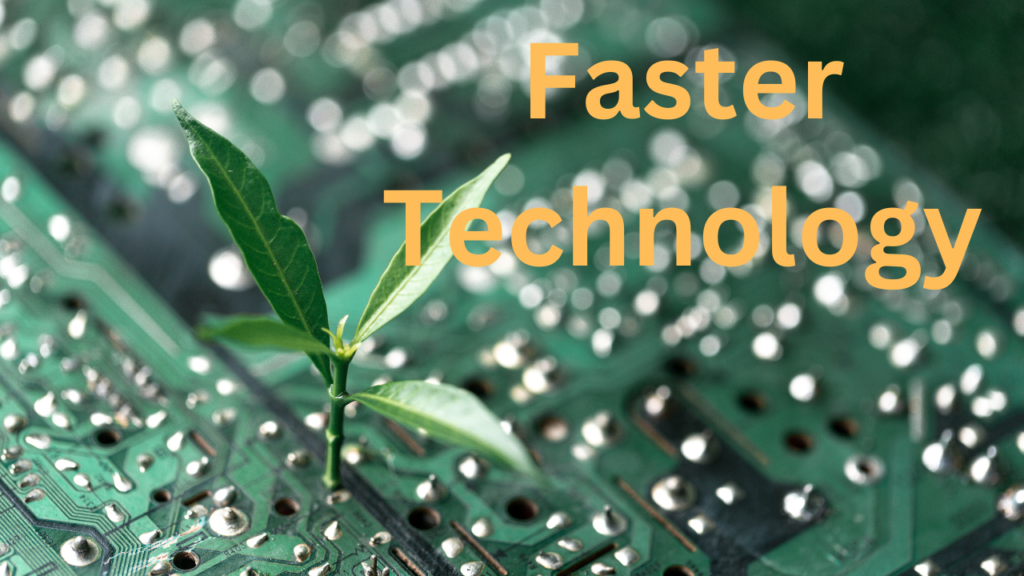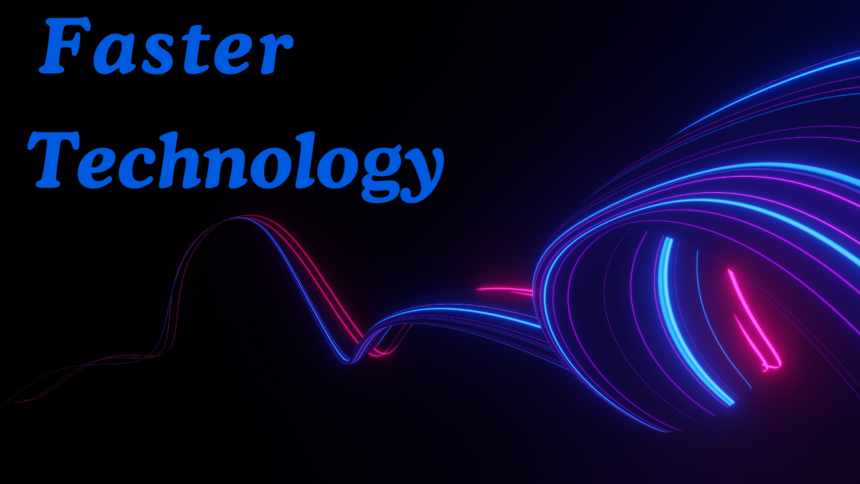In today’s world, technological advancements are evolving at an unprecedented pace. The need for faster technology is growing as industries and consumers demand greater efficiency, improved productivity, and seamless connectivity. From state-of-the-art hardware to innovative software solutions, faster technology is transforming every aspect of life, driving both economic growth and societal change. In this detailed article, we’ll explore the key elements of faster technology, its impact across various sectors, and the future it promises.
Why the World Needs Faster Technology
The modern economy thrives on speed and innovation. Whether it’s streaming high-definition content, executing complex calculations, or managing large amounts of data, the demand for faster technology has become essential. Faster technology enables companies to streamline their processes, maximize productivity, and stay competitive in the global marketplace.
The benefits of faster technology go beyond convenience. For example, advanced computing power enables scientists to conduct simulations that once took years in mere hours, leading to breakthroughs in fields like climate research and medicine. Similarly, faster internet speeds foster global collaboration, allowing businesses and individuals to connect in real time, regardless of their physical location.

The Evolution of Faster Technology
1. Computing Power: Revolutionizing Speed and Efficiency
One of the most significant advancements in faster technology is in computing power. Over time, computers have transformed from large, slow machines into compact devices capable of performing incredibly complex tasks in mere seconds. Moore’s Law, which predicted that the number of transistors on a chip would double every two years, has largely driven this progress, making processors increasingly powerful and efficient.
Quantum computing is the next frontier of faster technology. Unlike classical computers, which use bits, quantum computers use qubits, enabling them to process information at speeds that were previously unimaginable. This leap in computing technology has the potential to revolutionize industries such as pharmaceuticals, cryptography, and artificial intelligence by significantly enhancing data processing and analysis capabilities.
2. Faster Technology in Telecommunications: The Rise of 5G
Telecommunications is another sector that has experienced a dramatic transformation thanks to faster technology. The introduction of 5G networks marks a revolutionary leap, providing faster download and upload speeds, low latency, and vastly improved connectivity. This new era of ultra-fast communication opens the door to innovations like high-definition streaming, cloud gaming, and real-time virtual interactions.
The benefits of 5G go beyond consumer use. Sectors like healthcare and automotive technology stand to gain immensely. Faster technology in telecommunications enables remote surgeries to be performed in real time and allows autonomous vehicles to operate more efficiently and safely by reducing the time it takes for critical data to be processed and transmitted.
3. Data Storage: Faster Solutions for a Data-Driven World
As global data consumption continues to soar, the demand for faster technology in data storage has become crucial. Traditional hard disk drives (HDDs) have been replaced by faster and more reliable solid-state drives (SSDs). SSDs offer quicker data retrieval, providing faster boot times, file transfers, and system performance.
Moreover, the rise of Non-Volatile Memory Express (NVMe) technology, which takes advantage of PCIe interfaces, has further revolutionized storage. NVMe is designed to offer exceptional speeds in data storage and retrieval, significantly reducing bottlenecks. In today’s data-driven world, faster storage solutions ensure that businesses can make real-time decisions, optimize their operations, and keep up with growing demands.

The Impact of Faster Technology Across Industries
1. Healthcare: Faster Technology Saving Lives
In healthcare, the impact of it is nothing short of life-changing. Advanced diagnostic tools and medical imaging devices now rely on faster processing speeds to deliver more accurate results in less time. As a result, healthcare providers can detect diseases earlier and implement treatments more effectively.
Artificial intelligence (AI) and machine learning have also benefited from faster technology. These systems can process vast amounts of data, identifying patterns and trends that humans may miss. AI-powered diagnostics enable more precise medical assessments, while faster data analysis supports the development of personalized treatment plans.
Telemedicine has similarly seen exponential growth thanks to faster internet speeds and communication technologies. Doctors can now consult with patients remotely, often providing life-saving care in rural or underserved areas. Faster technology has made healthcare more accessible and efficient, reducing wait times and improving outcomes.
2. Manufacturing: Automation at High Speed
Manufacturing is another sector that has been revolutionized by faster technology. Automation, powered by faster computing systems, has transformed production lines, allowing for increased efficiency and higher output without sacrificing quality.
With faster technology, robots and automated systems can perform repetitive tasks more quickly and accurately than human workers. This has led to 24/7 production cycles in industries such as automotive and electronics manufacturing, where speed and precision are critical.
In addition, the Internet of Things (IoT) and faster technology have enabled the creation of smart factories. These facilities use interconnected devices and sensors to monitor performance in real-time, optimize workflows, and reduce downtime. This new level of connectivity, made possible by faster technology, is driving innovation and efficiency across the manufacturing sector.
3. Financial Services: Transactions at Lightning Speed
The financial industry has also seen massive benefits from it. Fintech innovations, powered by faster processing systems and secure online platforms, have transformed how people manage money and conduct transactions.
Cryptocurrencies and blockchain, which depend on faster technology for validation and processing, have introduced new ways to exchange value across borders, reducing transaction times from days to minutes. This faster technology has not only streamlined financial processes but also reduced costs.
High-frequency trading (HFT) is another area where it has made a significant impact. Traders use algorithms to execute thousands of trades in milliseconds, taking advantage of even the smallest market fluctuations. it has made this type of trading possible, allowing financial firms to make decisions at unprecedented speeds.

Challenges in Implementing Faster Technology
While it has the potential to revolutionize industries, its implementation presents certain challenges. One of the key issues is the technological divide that exists between different regions and populations. As it becomes more advanced, some individuals and businesses may struggle to keep up, leading to disparities in access and opportunity.
Security is another concern. As technology evolves, so do the methods used by cybercriminals to exploit vulnerabilities. The faster technology progresses, the more critical it becomes to ensure that robust cybersecurity measures are in place to protect data and networks from increasingly sophisticated threats.
Additionally, the environmental impact of this is an ongoing challenge. From the production of new hardware to the energy consumed by data centers, faster technology often comes with a higher carbon footprint. Balancing the benefits of faster technology with sustainable practices will be a key issue for companies and governments in the future.

The Future of Faster Technology
The future of faster technology is both exciting and transformative. Several emerging trends are set to drive innovation even further, promising to reshape industries and society as we know it.
1. Artificial Intelligence and Machine Learning
As faster technology continues to advance, artificial intelligence and machine learning will become even more integrated into daily life. These systems depend on faster processing speeds to analyze massive amounts of data and make decisions in real time. Future applications could include advancements in areas such as personalized medicine, smart cities, and autonomous systems.
2. Quantum Computing
Quantum computing represents the next significant leap in faster technology. By using qubits instead of traditional bits, quantum computers will be able to solve problems that are currently beyond the reach of classical computers. This will have far-reaching implications in fields such as drug discovery, encryption, and climate modeling.
3. Edge Computing
Edge computing is an emerging trend that focuses on bringing data processing closer to the source of the data, reducing latency and improving speed. By decentralizing the computing process, edge technology will provide faster, more efficient solutions for real-time applications such as IoT devices and autonomous vehicles.
Conclusion
Faster technology is driving the future of innovation, reshaping industries, and transforming everyday life. From healthcare to finance, manufacturing to telecommunications, faster technology is enabling us to perform tasks more efficiently and solve problems that were once insurmountable. However, with these advancements come challenges—ensuring equitable access, protecting data, and minimizing environmental impact will be critical as it continues to evolve.
The future of faster technology promises even greater breakthroughs, with AI, quantum computing, and edge computing leading the charge. As we look ahead, the speed and efficiency of these technologies will undoubtedly define the next generation of innovation.
